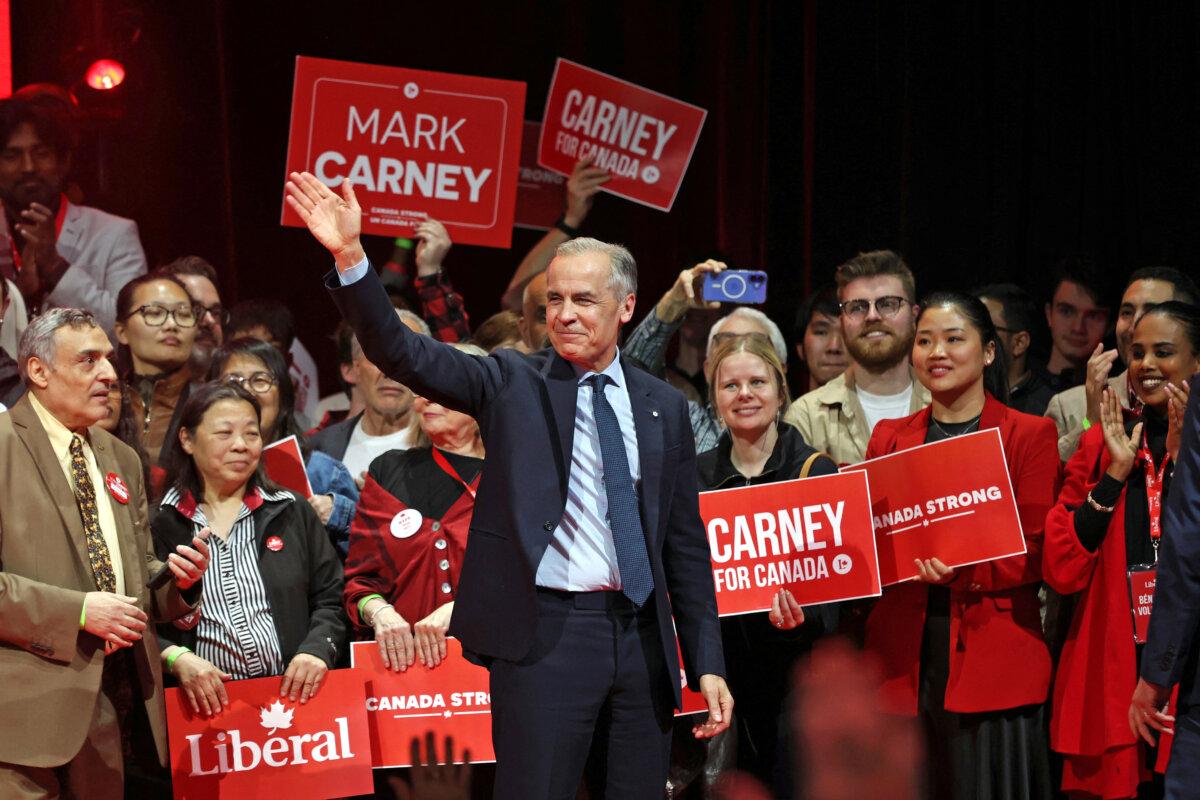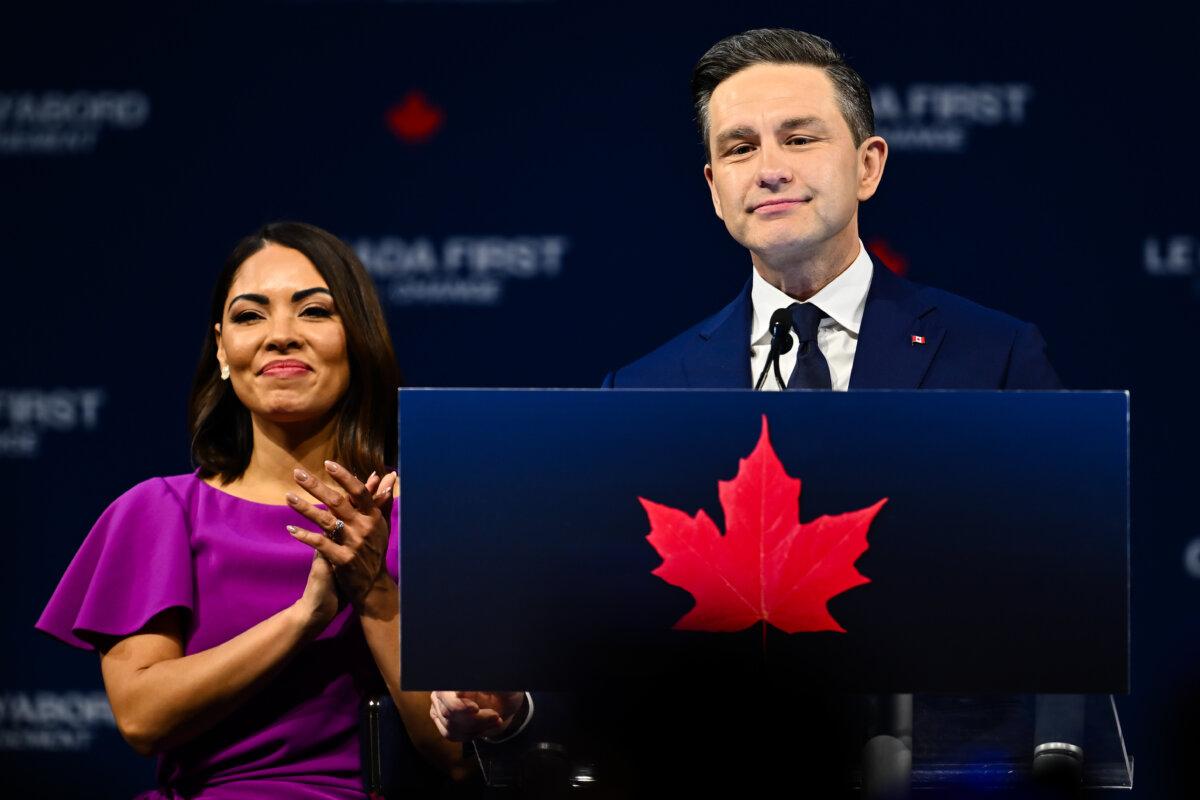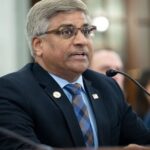By Tom Ozimek
The Liberal Party, led by Canadian Prime Minister Mark Carney, has won Monday’s federal election in Canada, capping a campaign shaped in part by President Donald Trump’s tariff threats and calls to make Canada the 51st American state.
According to preliminary results from Elections Canada, the Liberals captured 168 seats with 43.6 percent of the popular vote—four short of the 172 needed for a majority in the 343-seat House of Commons, Canada’s equivalent of the U.S. House of Representatives. That outcome puts Carney on track to lead a minority government.
Unlike the American system, where the president is directly elected by voters, Canada’s prime minister is not elected by the public. Instead, the position is held by the leader of the party that can command the confidence of the House of Commons, typically the party that wins the most seats in an election. If no party wins an outright majority, the party with the largest share of seats is usually invited by the Governor General to form a government and attempt to govern, either alone or with the support of other parties.
The Liberals’ main rival—the Conservative Party of Canada, led by Pierre Poilievre—won 144 seats with 41.4 percent of the popular vote.


The Bloc Québécois—a Quebec nationalist party advocating greater autonomy for Quebec within Canada—captured 23 seats with 6.4 percent of the vote.
The New Democratic Party (NDP)—broadly comparable to progressive Democrats in the United States—secured seven seats with 6.3 percent of the vote.
Minor parties and independents combined claimed one seat.
If the current tallies hold, Carney will be reappointed as prime minister and asked to form a new cabinet. With a 168-seat minority, the Liberals will have two options: govern alone by negotiating support on a vote-by-vote basis with other parties, or enter into a formal coalition, which would involve a written agreement and shared cabinet positions.
Formal coalitions are extremely rare in Canadian federal politics, making it far more likely that Carney will lead a minority government supported informally by other parties when needed.
Poilievre, Carney’s main rival, was voted out of his seat in the House of Commons, according to preliminary results. Liberal candidate Bruce Fanjoy was set to win the Ottawa-area riding of Carleton with 42,512 votes, or 50.6 percent of the total. Ridings are the Canadian equivalent of congressional districts. Poilievre—who has represented Carleton since 2004—had 38,675 votes, or 46 percent.
While the loss of his seat represents a major political setback, Poilievre can legally remain as the leader of the Conservative Party. In a concession speech delivered before his own race was called, Poilievre vowed to keep fighting for Canadians.
“We are cognizant of the fact that we didn’t get over the finish line yet,” Poilievre told supporters. “We know that change is needed, but change is hard to come by. It takes time. It takes work. And that’s why we have to learn the lessons of tonight—so that we can have an even better result the next time Canadians decide the future of the country.”

Just months ago, Poilievre looked poised to become Canada’s next prime minister, set to return the Conservatives to power and end a decade of Liberal rule. Voter sentiment shifted after the U.S. president’s tariff threats and suggestions of annexation.
Trump has cited unfair trade practices and Canada’s low military spending as reasons for the proposed annexation, which he said will benefit both countries in various aspects. He has also accused Ottawa of imposing high tariffs on some U.S. exports—such as dairy—and of freeloading on U.S. military protection, pointing out that Canada spends far less on its defence than the NATO target of 2 percent of GDP. Late last week, Trump warned that he might raise tariffs on Canadian-made cars, which were set at 25 percent in late March.
On April 28, Canada’s election day, Trump expressed well wishes for Canadian voters and reiterated his call for the northern neighbor to join the United States.
“Good luck to the great people of Canada. Elect the man who has the strength and wisdom to cut your taxes in half, increase your military power, for free, to the highest level in the World, have your Car, Steel, Aluminum, Lumber, Energy, and all other businesses, QUADRUPLE in size, WITH ZERO TARIFFS OR TAXES, if Canada becomes the cherished 51st. State of the United States of America,” he wrote on social media.
Poilievre had largely focused his campaign on economic and affordability issues, while Carney described the election as a battle to defend Canadian independence, portraying Trump’s remarks about Canada as a serious warning for the country’s future.
In his victory speech, Carney emphasized the need for national unity, economic growth, and a strong response to U.S. tariffs and calls for the annexation of Canada.
“Let’s put an end to the vision and anger of the past. We are all Canadian, and my government will work for and with everyone,” Carney said, while thanking his election rivals.
Carney pledged that, under his leadership, Canada would “build, baby, build,” create hundreds of thousands of “good jobs,” and become an “energy superpower in both clean and conventional energy.”
“It’s time to build an industrial strategy that makes Canada more competitive while fighting climate change,” he said.
Carney repeated his earlier warnings that under Trump’s presidency, the United States’ relationship with Canada—once based on what he called a “system of open global trade”—had fundamentally shifted, calling it a “shock” and a “betrayal.”
“As I’ve been warning for months, America wants our land, our resources, our water, our country,” Carney said.
“That will never … ever happen.”
Liberal support in the election was boosted by the collapse of the progressive NDP vote, with Carney’s party picking up much of that support.
Like Poilievre, NDP Leader Jagmeet Singh also lost his seat. However, while Poilievre said he will stay on as leader, Singh announced that he will step down.
“Obviously, I’m disappointed that we could not win more seats, but I’m not disappointed in our movement. I’m hopeful for our party,” Singh told supporters in his post-election speech.
Part of Poilievre’s campaign strategy had been to make the election a referendum on former Prime Minister Justin Trudeau, whose popularity sagged during his decade in power amid rising food and housing costs.






